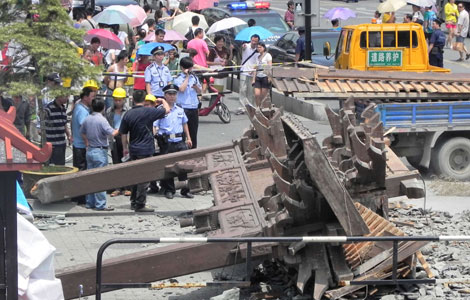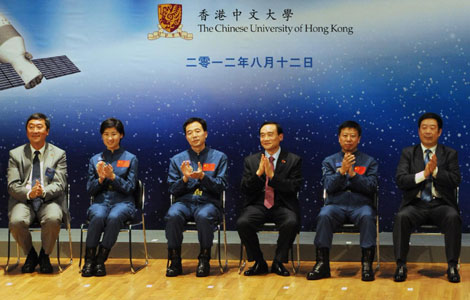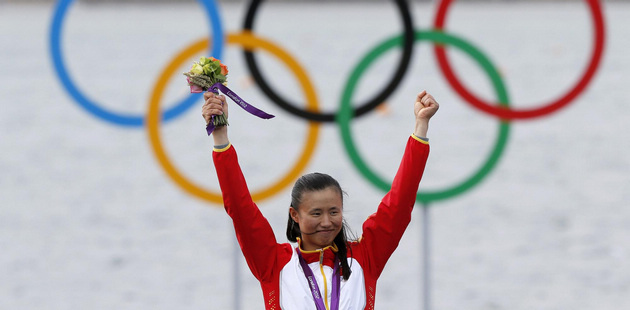China’s Kunqu Opera classics set to impress the UK
Updated: 2012-08-10 16:37
(China Daily)
|
|||||||||||
Two rare performances of Kunqu Opera in London will transport audiences to ancient China. As part of the Beijing Culture Week organised by the gov ernment of Beijing, the
Northern Kunqu Opera Theater will give two performances at the Shaw Theatre of London — ADreamofRedMansionson July 24 and A New Legend of Pipa on the following day.
“Kunqu is regarded as the ‘origin of a hun dred operas’ in China,” Northern Kunqu OperaTheater’svice-presidentCaoNingsaid.
“It has a history of 600 years and has influ enced not only many styles of Chinese opera but also Chinese literature, music and art.”
In A Dream of Red Mansions, one of Chi na’s “Four Great Classical Novels”, there are 26 depictions of Kunqu, the best-known of which is the part about the heroine Lin Daiyu being enchanted by 12 girls’ singing Kunqu in the 23rd chapter.
However, there was never a Kunqu adap tation of A Dream of Red Mansions, except for some excerpts, until the Northern Kunqu OperaTheaterpremieredtheirversionlastyear.
“ A Dream of Red Mansions is a great work that covers various aspects of feudal Chi na, including political, social and cultural aspects, and even medicine and food,” the work’s general director Cao Qijing said.
“It’s a great challenge for us to bring it to the stage.” Written by Cao Xueqin in the middle of the 18th century, A Dream of Red Mansions tells about the rise and decay of a noble fam ily and, by extension, of the Qing Dynasty (1644-1911). The best-known plotline of the work is the tragic love story between Jia Baoyu and his cousin, Lin, who are forced to part by Jia’s family. “The love story is only a part of the work,” Cao said. “In this performance, we try to portray the characters’ destinies with that of their society.”
The Kunqu Opera A Dream of Red Man sions lasted for six hours and was divided into two performances when it premiered. The London show will be a concise version, lasting about two hours. The cast comprises not only award-win ning performers from the Northern Kun qu Opera Theater like Wei Chunrong but also performers from Kunqu companies in Shanghai and Jiangsu province.
When adapted into other forms of Chinese operas, some paralleled plots from the novel were given lineal narration. But the Kunqu version has some plots run simultaneously onstage — for example, that of Lin burning her scripts and Jia’s wedding. “The lyrics of Kunqu are much more ele gant than those of today’s dramas, and read ing the lyrics alone is very enjoyable,” Cao, the director , said Kunqu’s music is also softer than many other traditional Chinese operas, such as Peking Opera, with qudi (a type of flute) as a main instrument.
Accompanying A Dream of Red Mansions is an orchestra with 40 musicians. Apart from Chinese instruments, there are also Western instruments like violins, violas and cellos. “For this original work, we want to experi ment with some new instruments, and they proved to be suitable to supplement the band,” Cao Ying says. “We don’t know how Kunqu was per formed 600 years ago. But it must have gone through many reforms and experiments from generation to generation.” The other work the Northern Kunqu Opera Theater will present in London, A New Legend of Pipa, is a traditional work and will be performed only with Chinese instruments. Interestingly, the work’s author Cao Yin (1658-1712) was the grandfather of Cao Xueqin, the author of A Dream of Red Man sions.
A New Legend of Pipa hasn’t been per formed for centuries and was only recently revived by the Northern Kunqu Opera The ater after a script was found in the National Library of China. The work tells of Cai Wenji, a Han Dynasty (206 BC-AD 220) poet and composer, who was taken prisoner by the Xiongnu nomads and became a chieftain’s wife but was eventu ally ransomed back. Founded in Beijing in 1957, the North ern Kunqu Opera Theater is one of China’s Northern Kunqu Opera Theater will make its debut in London for the 2012 Olympics, mu Qian seven professional Kunqu troupes and the only one in North China. The troupe has revived and created many Kunqu Opera works and trained a number of renowned performers.
There has been increasing interest in Kun qu Opera in recent years. Apart from the seven official Kunqu Opera troupes in China, there are many smaller commercial groups. In Beijing, there are several Kunqu Opera themed restaurants.
The Northern Kunqu Opera Theater had 360 performances in 2010, including some in universities, which students very much welcomed.
“People are ever-busier,” Cao Ying said. “Watching Kunqu Opera enables one to slow down and be spiritually purified. I think that’s why Kunqu Opera is becoming more popular.”
Northern Kunqu Opera Theater has toured more than 30 countries and regions. “We assumed that the traditional art of Kunqu Opera is difficult for foreigners to appreciate,” Cao Ying said. “But foreign audiences usually enjoy our performances very much.” English subtitles will be provided for both shows in London.
reports. Two rare performances of Kunqu Opera in London will transport audiences to ancient China. As part of the Beijing Culture Week organised by the gov ernment of Beijing, the
Northern Kunqu Opera Theater will give two performances at the Shaw Theatre of London — ADreamofRedMansionson July 24 and A New Legend of Pipa on the following day.
“Kunqu is regarded as the ‘origin of a hun dred operas’ in China,” Northern Kunqu OperaTheater’svice-presidentCaoNingsaid.
“It has a history of 600 years and has influ enced not only many styles of Chinese opera but also Chinese literature, music and art.”
In A Dream of Red Mansions, one of Chi na’s “Four Great Classical Novels”, there are 26 depictions of Kunqu, the best-known of which is the part about the heroine Lin Daiyu being enchanted by 12 girls’ singing Kunqu in the 23rd chapter.
However, there was never a Kunqu adap tation of A Dream of Red Mansions, except for some excerpts, until the Northern Kunqu OperaTheaterpremieredtheirversionlastyear.
“ A Dream of Red Mansions is a great work that covers various aspects of feudal Chi na, including political, social and cultural aspects, and even medicine and food,” the work’s general director Cao Qijing said.
“It’s a great challenge for us to bring it to the stage.” Written by Cao Xueqin in the middle of the 18th century, A Dream of Red Mansions tells about the rise and decay of a noble fam ily and, by extension, of the Qing Dynasty (1644-1911). The best-known plotline of the work is the tragic love story between Jia Baoyu and his cousin, Lin, who are forced to part by Jia’s family.
“The love story is only a part of the work,” Cao said. “In this performance, we try to portray the characters’ destinies with that of their society.” The Kunqu Opera A Dream of Red Man sions lasted for six hours and was divided into two performances when it premiered. The London show will be a concise version, lasting about two hours.
The cast comprises not only award-win ning performers from the Northern Kun qu Opera Theater like Wei Chunrong but also performers from Kunqu companies in Shanghai and Jiangsu province. When adapted into other forms of Chinese operas, some paralleled plots from the novel were given lineal narration. But the Kunqu version has some plots run simultaneously onstage — for example, that of Lin burning her scripts and Jia’s wedding. “The lyrics of Kunqu are much more ele gant than those of today’s dramas, and read ing the lyrics alone is very enjoyable,” Cao, the director , said Kunqu’s music is also softer than many other traditional Chinese operas, such as Peking Opera, with qudi (a type of flute) as a main instrument.
Accompanying A Dream of Red Mansions is an orchestra with 40 musicians. Apart from Chinese instruments, there are also Western instruments like violins, violas and cellos. “For this original work, we want to experi ment with some new instruments, and they proved to be suitable to supplement the band,” Cao Ying says. “We don’t know how Kunqu was per formed 600 years ago. But it must have gone through many reforms and experiments from generation to generation.” The other work the Northern Kunqu Opera Theater will present in London, A New Legend of Pipa, is a traditional work and will be performed only with Chinese instruments. Interestingly, the work’s author Cao Yin (1658-1712) was the grandfather of Cao Xueqin, the author of A Dream of Red Man sions. A New Legend of Pipa hasn’t been per formed for centuries and was only recently revived by the Northern Kunqu Opera The ater after a script was found in the National Library of China. The work tells of Cai Wenji, a Han Dynasty (206 BC-AD 220) poet and composer, who was taken prisoner by the Xiongnu nomads and became a chieftain’s wife but was eventu ally ransomed back. Founded in Beijing in 1957, the North ern Kunqu Opera Theater is one of China’s
Singing an ancient opera’S praiSeS Kunqu Opera is one of the oldest There has been a revival of the art extant forms of Chinese opera. form since the 1980s. It evolved from the Kunshan melody Today, there are professional Kunqu and developed during the late Yuan Opera troupes in seven cities on the pioneer was Gu Jian from Qiandeng and Nanjing in Jiangsu province, Chen town in Kunshan, Jiangsu province. zhou in Hunan province, and Yongjia Kunqu Opera dominated Chinese and Hangzhou in Zhejiang province.
Hot Topics
iphone,shenzhou,taiwan,hiv,school bus,house,hk,tibet,rare earth,food safety,dairy
Editor's Picks

|

|

|

|

|

|





